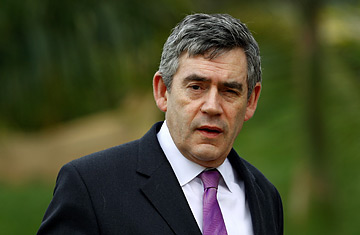
Britain's Prime Minister Gordon Brown
Embattled heads of government often find solace in foreign affairs. At a comfortable remove from the rough-and-tumble of domestic politics, they can cultivate a statesmanlike image on the international stage. No such luck for Gordon Brown, Britain's Prime Minister: a nasty scandal brewing in the U.K. followed him all the way to Uganda. It was there, he says, on the eve of his return from the Commonwealth Heads of Government Meeting in Kampala, that he learned that the Labour Party's General Secretary Peter Watt had accepted donations for party coffers in a potentially criminal breach of the rules on party funding. Watts has admitted that he knew some donations originated from a wealthy businessman named David Abrahams but were channeled to the party through a number of other individuals. British law stipulates that the real identity of donors must be reported to the U.K. Electoral Commission. Watt resigned on Nov. 26. Brown, now back in Downing Street, summoned journalists to his monthly press conference the next day. "Mistakes have been made," he told them. "There will have to be changes."
There's one change increasing numbers of Britons want, according to a fresh opinion poll — a new government. A survey for The Independent newspaper, completed on Nov. 25, when news of this latest government scandal had only broken that morning, puts the Conservative party 19 points ahead of Labour. That's the most substantial lead the Tories have enjoyed since Margaret Thatcher's third prime ministerial term in 1988.
Such a lead would theoretically deliver a 64-seat majority for the Tories. Unfortunately for them, however, it appears they will have a long wait before Brown calls an election. Tony Blair led Labour to victory in 2005, and Brown took over when Blair stepped down in June of this year. That means Brown doesn't have to call a new poll until May 2010. Brown balked at plans for a snap election early this fall against the urging of some of his political confidants. They advised him to seek a fresh mandate as quickly as possible, trading on the reputation for competence he gained as Chancellor of the Exchequer and during his first months as Prime Minister.
After a series of mishaps, upheavals and slip-ups, that reputation looks tattered. The U.K. economy is being buffeted by the shockwaves from the subprime crisis in the U.S.; Britain's fifth-largest mortgage lender, Northern Rock, is being kept afloat by guarantees from the Bank of England. Brown has defended his government's handling of the affair, and says his response to diverse challenges in the first months after he took office prove his competence. He looked calm and in control after terrorists targeted London and Glasgow in July and when an outbreak of foot-and-mouth disease was followed in September by the first case of bluetongue virus affecting U.K. livestock.
It's tougher to put a positive gloss on the loss of two CDs containing vital personal information about 25 million Britons, including bank details and other data that could be exploited by identity fraudsters. Brown's successor as Chancellor, Alistair Darling, told incredulous colleagues in the House of Commons on Nov. 20 that the discs intended for the National Audit Office had sent by the standard courier service used for internal government mail by an official at the government department HM Revenue & Customs, flouting guidelines on the security of such data. The discs never reached their destination.
"Problems do arise for which the Prime Minister directly is not responsible," said Brown at his Nov. 27 Downing Street press conference. Separate investigations into the missing discs and the dodgy donations will attempt to uncover exactly what went wrong and who is to blame. If Brown is to regain public support, he'll have to convince the public that the buck doesn't stop in Downing Street.
